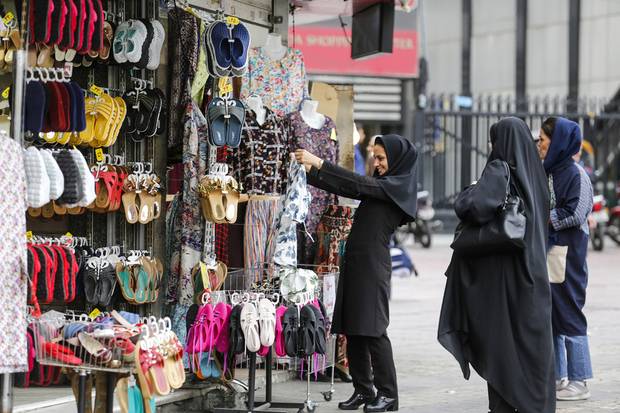Iranians have expressed fear of what may happen after the US withdrew from the nuclear deal, but the alarm at a potential hammer-blow to their livelihoods is more prominent than the threat of war.
Most spoken to by Middle East Eye say the result of the re-establishment of sanctions will have a major impact on an already feverish Iranian economy, which has suffered from years of isolation and blockade by world powers.
As a carpet seller, I rely on international tourists for approximately 40 percent of my income. If this disappears, it will be an everyday struggle.
In Tehran’s bazaar, where MEE interviewed several shop owners, the reactions ranged from disdain to apprehension. All wished to remain anonymous due to concerns their comments would be reported to the government.
“We have survived through decades of blockade and our country has never been as strong as it is today. What do you think the USA is going to achieve now?” said one salesman.
Others fear the consequences of increased isolation will affect the tourism industry, a vital source of income for the bazaar.
“The increase of tensions will make more than one shop owner close his business. Me, for example, as a carpet seller, I rely on international tourists for approximately 40 percent of my income. If this source of profit disappears, it will be an everyday struggle to make ends meet,” the seller said.

“The future is grim as I see it, unfortunately,” the seller added.
Further sanctions led by the US administration may also have a devastating affect on Iran’s industrial sectors, particularly gas and oil, and the automobile industry. Many think that medicine and other vital needs will be harder to find.
“My friend has a member of his family that suffers from cancer: It’s already too expensive for them to go through medical tests. Medicine is also very expensive and sometimes out of stock. It’s the government’s job to provide the medicine for the neediest,” complained another Iranian on Twitter.
The financial situation in Iran also raises a lot of concerns.
Many young Iranians see leaving their country as their only option.
My friend has a member of his family that suffers from cancer… medicine is also very expensive and sometimes out of stock.
“People are thinking of emigrating. But it’s not a solution for everyone: many will end up being refugees,” said a young woman in Tehran’s Azadi square. “Youth unemployment remains a major issue that the government has not been able to tackle significantly,” she added.
Many Iranians expressed exasperation at what they see as yet another aggression against the Iranian people. They believe that it will have no success whatsoever in bringing a change in government.
“We had a bad experience with sanctions and regime change before,” said a Tehrani who wished to remain anonymous.
“The only thing that is constant is that people are always struggling to survive. This new backfire from the US administration is going to be another burden for the people.
“Sanctions never helped to bring regime change. The regime always managed to keep going. During the Ahmadinejad mandate, the government was going around the sanctions.”
Another anonymous resident said: “The problem with this new deal is that it was Rouhani’s last chance. Now Sepah (aka the Pasdaran, the most conservative branch of the military that holds a lot of power on the Iranian institutions) can use this to destroy him.”

The current Iranian president Hassan Rouhani is seen by many as one of the most moderate leader Iran in recent memory, but many believe that the Trump administration has jeopardised all hopes of normalising Iran’s relations with its neighbors and with the international community in general.
“For 40 years, the regime tried to make us hate the USA, but failed. Trump succeeded in a year,” tweeted one Iranian following the news of the US withdrawal.
The large gap of the standards of living between elite and the middle or lower classes is also a major concern according to many Iranians.
“Those who burned the American flag today will be walking in the streets of Vancouver and Toronto tomorrow,” said another Tehran resident, alluding to the burning of an Iranian flag by MPs last Thursday and to the fact that many of the elite in the country enjoy dual citizenship which permits them to fly out of the country as much as they want.
For 40 years, the regime tried to make us hate the USA, but failed. Trump succeeded in a year.
Others have expressed their views on Twitter and other social media feeds following Trump’s speech last Wednesday, criticising the US president, but also directly pointing the finger at their own government for the dire situation.
Anger and impatience from the common people towards their leaders is more evident than ever after this new setback.
Thus, an Iranian journalist shared on Twitter: “I called a member of the government for an interview today; he said, but our problems in the country are going to be solved by the coming of the 12th imam or by the passing time. And I answered: why are you getting paid for that, then?”
Another, after the head of the Iranian central bank said that the US withdrawal from the Iran nuclear deal would have no impact on the Iranian economy, replied: “What economy are you talking about?”
Despite the economic tough times Iran is going through, Iranian twitter users still had the humor to make sardonic comments about the situation.
Perhaps one of the most significant phenomenon in this regard is the use of the #ThankyouTrump by many Iranian twitter users, ironically reflecting on the impact that an aggressive American administration could have on destabilising the Iranian government itself.
By Sylvain Mercadier via Middle East Eye






